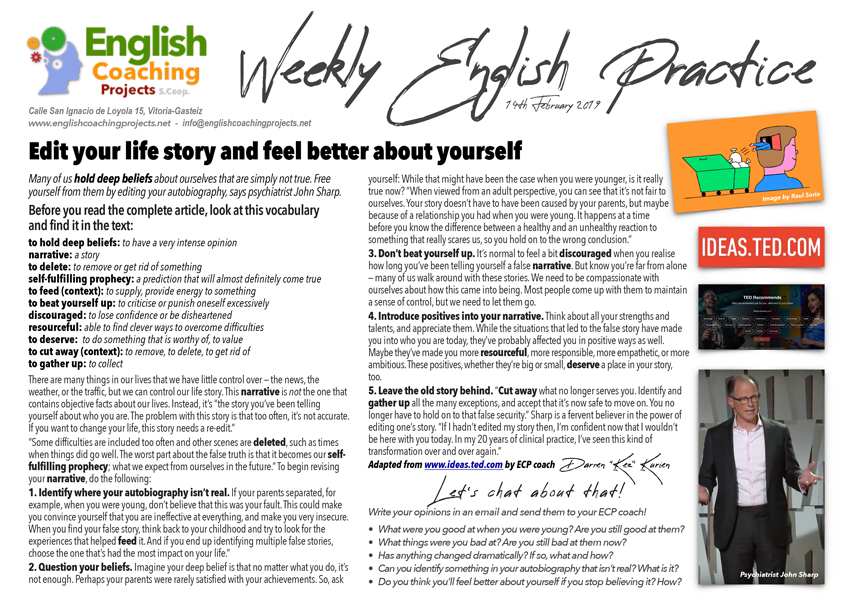This week’s article is based on a TEDx Talk by John Sharp and talks about how we can look back on our life and ‘edit’ it. To find out more, read this week’s Weekly English Practice!
Click on the image to download the pdf
Many of us hold deep beliefs about ourselves that are simply not true. Free yourself from them by editing your autobiography, says psychiatrist John Sharp.
Before you read the complete article, look at this vocabulary and find it in the text:
to hold deep beliefs: to have a very intense opinion
narrative: a story
to delete: to remove or get rid of something
self-fulfilling prophecy: a prediction that will almost definitely come true
to feed (context): to supply, provide energy to something
to beat yourself up: to criticise or punish oneself excessively
discouraged: to lose confidence or be disheartened
resourceful: able to find clever ways to overcome difficulties
to deserve: to do something that is worthy of, to value
to cut away (context): to remove, to delete, to get rid of
to gather up: to collect
Listen to the audio (refresh the page if it’s not visible)
There are many things in our lives that we have little control over — the news, the weather, or the traffic, but we can control our life story. This narrative is not the one that contains objective facts about our lives. Instead, it’s “the story you’ve been telling yourself about who you are. The problem with this story is that too often, it’s not accurate. If you want to change your life, this story needs a re-edit.”
“Some difficulties are included too often and other scenes are deleted, such as times when things did go well. The worst part about the false truth is that it becomes our self-fulfilling prophecy; what we expect from ourselves in the future.” To begin revising your narrative, do the following:
1. Identify where your autobiography isn’t real. If your parents separated, for example, when you were young, don’t believe that this was your fault. This could make you convince yourself that you are ineffective at everything, and make you very insecure. When you find your false story, think back to your childhood and try to look for the experiences that helped feed it. And if you end up identifying multiple false stories, choose the one that’s had the most impact on your life.”
2. Question your beliefs. Imagine your deep belief is that no matter what you do, it’s not enough. Perhaps your parents were rarely satisfied with your achievements. So, ask yourself: While that might have been the case when you were younger, is it really true now? “When viewed from an adult perspective, you can see that it’s not fair to ourselves. Your story doesn’t have to have been caused by your parents, but maybe because of a relationship you had when you were young. It happens at a time before you know the difference between a healthy and an unhealthy reaction to something that really scares us, so you hold on to the wrong conclusion.”
3. Don’t beat yourself up. It’s normal to feel a bit discouraged when you realise how long you’ve been telling yourself a false narrative. But know you’re far from alone — many of us walk around with these stories. We need to be compassionate with ourselves about how this came into being. Most people come up with them to maintain a sense of control, but we need to let them go.
4. Introduce positives into your narrative. Think about all your strengths and talents, and appreciate them. While the situations that led to the false story have made you into who you are today, they’ve probably affected you in positive ways as well. Maybe they’ve made you more resourceful, more responsible, more empathetic, or more ambitious. These positives, whether they’re big or small, deserve a place in your story, too.
5. Leave the old story behind. “Cut away what no longer serves you. Identify and gather up all the many exceptions, and accept that it’s now safe to move on. You no longer have to hold on to that false security.” Sharp is a fervent believer in the power of editing one’s story. “If I hadn’t edited my story then, I’m confident now that I wouldn’t be here with you today. In my 20 years of clinical practice, I’ve seen this kind of transformation over and over again.”
Adapted from www.ideas.ted.com by ECP coach Darren “Kez” Kurien
Let’s chat about that!
Write your opinions in an email and send them to your ECP coach!
- What were you good at when you were young? Are you still good at them?
- What things were you bad at? Are you still bad at them now?
- Has anything changed dramatically? If so, what and how?
- Can you identify something in your autobiography that isn’t real? What is it?
- Do you think you’ll feel better about yourself if you stop believing it? How?


